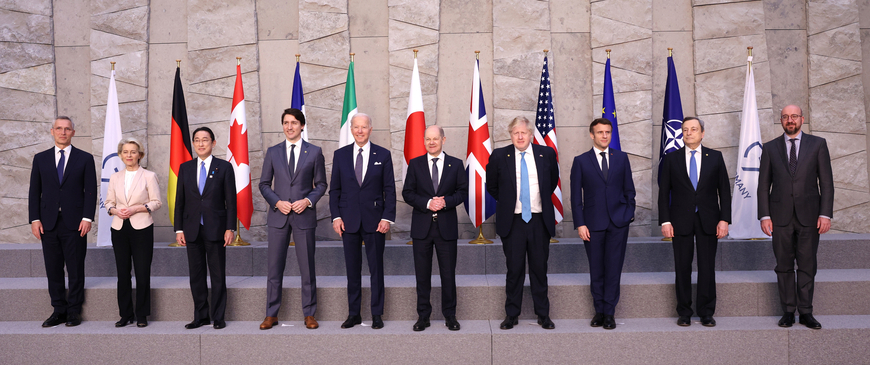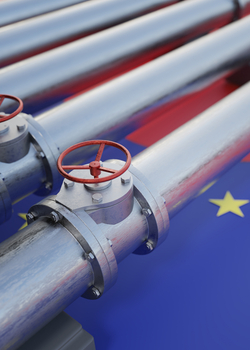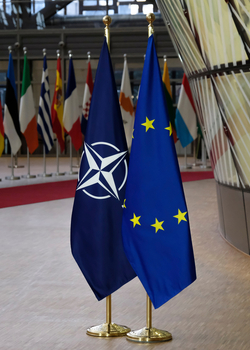
Can the West stay united on Ukraine – and what will China do?
The longer the war in Ukraine continues, the greater the risk that Western unity will fracture. Meanwhile the choices that China makes will determine the future shape of geopolitics.
Although Russia’s invasion of Ukraine has caused untold suffering, it has forged a stronger sense of identity among the people of that country. It has also fueled inflationary pressures – driven by shortages of oil, gas, metals and cereals – and will stymie global growth. Geopolitically, most of the consequences have so far been benign, with the Western states displaying an impressive degree of unity. But the longer the war continues, the more tensions among the allies are likely to grow.
Geopolitically, most of the consequences of Russia’s invasion of Ukraine have so far been benign, with the Western states displaying an impressive degree of unity.
First, the good news. In the US, although Republicans and Democrats remain contemptuous of each other, they are working together to put pressure on Russia. Across the Atlantic, there is harmony: the ill-feeling left by President Joe Biden’s chaotic withdrawal from Afghanistan and the AUKUS (Australia-UK-US) defence pact has dissipated, while the principal leaders are keeping each other informed of their moves.
Some of the worst rifts in Europe have diminished: London and Brussels remain far apart over how to interpret the Northern Ireland Protocol, but neither wants to provoke a confrontation in the middle of a security crisis. Similarly, the row between Warsaw and Brussels over the independence of Poland’s judiciary has quietened down, for now. As for Turkey’s dire relations with the EU and the US, Turkish sympathies for Ukraine create the possibility of a modest rapprochement.
The most surprising result of the invasion has been Germany’s Zeitenwende (historic shift) on defence: Berlin wants to boost spending massively, supply weapons to Ukraine and buy new equipment, including jets to carry American nuclear weapons. Chancellor Olaf Scholz appears to back President Emmanuel Macron’s plans for strengthening Europe’s defence capabilities. The EU’s Atlanticist members will ensure that European defence is NATO-compatible (and try to include the British).
But will these positive developments endure? September 11th 2001 may offer a cautionary tale. Those terrorist attacks brought the major powers together. NATO invoked Article 5 for the first and only time in its history. President George W Bush, whose America-first unilateralism had worried the Europeans, veered towards multilateralism. Russia, and to a lesser degree China, gave firm and unambiguous support to the US and its subsequent efforts to lead an international force into Afghanistan. The EU states agreed on the European Arrest Warrant, a significant measure of integration that would make life harder for terrorists and other criminals.
But the harmony did not last long. Bush’s decision to invade Iraq, 18 months after 9/11, split the West and the EU in two, alienating Moscow and Beijing in the process.
In 2022, many issues could yet divide the allies, and in particular the EU-27 (as my colleagues have written):
- Enlargement. Most Central European and Baltic states want to offer Ukraine a clear route to EU membership. Some would do the same for Moldova and Georgia. Others, including the French and the Dutch, think Ukraine isn’t ready and worry that fast-tracking it would badly affect applicants from the Western Balkans.
- Refugees. The nearly 4 million Ukrainian refugees who have entered the EU have so far caused less disruption than the flows from the Middle East and North Africa in 2015-16. But the numbers will grow and questions of burden-sharing could easily create divisions.
- Energy. Germany, Hungary, Italy and Bulgaria are among those most dependent on Russian gas imports, and therefore oppose a complete ban on energy trade with Russia. Others emphasise that excluding Russian hydrocarbons would accelerate the introduction of green technologies.
- Defence. The EU’s hawks will keep pushing for more military help for Ukraine, but others will worry about the risks of provoking Russia into starting a general war. Everybody wants to spend more on defence, but some will find that very difficult, given the competing demands on budgets.
- Peace talks. There will be many diplomatic efforts to end the war. If President Vladimir Putin wanted to, he could probably divide the Europeans by proposing a peace plan that gave Russia just a few bits of Ukraine. Some EU countries might favour such a compromise, while others would argue that Russia should get nothing. But Putin does not yet appear serious about peace – and for now the Western allies agree that it is up to Ukrainian President Volodymyr Zelenskyy to negotiate as he sees best.
- China. If China breaches Western sanctions against Russia, the US will put pressure on Europeans to sanction China. But Europeans depend more on trade with China than do Americans, and some of them, notably Germany, will hesitate before curbing economic ties.
The single biggest variable that will determine the shape of post-war geopolitics may be China’s stance on Ukraine. The first indications are not encouraging. President Xi Jinping seems to see the world primarily through the prism of China’s rivalry with the US. Russia in general and Putin in particular are trusty allies against the US: China can count on Russia’s support in the UN Security Council, for example against Western initiatives on human rights. They agree that big autocracies should enjoy spheres of influence in their neighbourhoods. China enjoys secure access to Russia’s oil and gas. Putin’s demise would be very bad news for Xi.
Yet, against that, China does support the principles of territorial integrity and national sovereignty. And it doesn’t want a complete rupture with the West, since that would create economic difficulties – at a time when Covid, mountains of debt and a bursting property bubble are already causing strains at home. So far China has adopted a position of formal neutrality, while leaning rhetorically towards Russia. It blames the US and NATO for provoking the conflict – and according to US intelligence is considering Russian requests for military assistance. China may well try to keep to the letter but not the spirit of Western sanctions on Russia.
The war in Ukraine could easily last a long time. If China chooses to line up alongside Russia, the West will probably respond with tough sanctions (even if some Europeans are reluctant to apply them) on trade, investment and technology. The world would be less multipolar and more bifurcated into two rival blocs. Supply chains would shorten, and less trade would impair growth. In Beijing there are voices that view this prospect with some alarm, but for now they are quiet.
The war in Ukraine could easily last a long time. If China chooses to line up alongside Russia, the West will probably respond with tough sanctions.
The invasion of Ukraine, like Covid, has exaggerated trends that were already evident. Even in the years before the invasion, Germany’s defence budget was rising, the EU was making efforts to achieve ‘strategic autonomy’ in areas like energy, microchips and defence, and some supply chains were shortening. And Russia’s eastwards trajectory was clear. As the CER’s annual report on 2020 commented: “Biden’s emphasis on human rights…will leave Russia with little choice but to line up with China geopolitically.” With Russia’s leaders showing “no signs of wanting to break its dependency on hydrocarbon exports or the kleptocratic system that such an economy feeds, [and] omnipresent gangsterism causing economic harm, living standards will erode slowly as Russia drifts into the Sinosphere.”
Now Western sanctions on Russia will hasten that erosion. Putin’s regime has certainly been weakened by the war, though that does not necessarily mean he will fall from power soon. Meanwhile Europeans should do what they can to dissuade China from becoming too closely entangled with Putin. A new Cold War would not be good for China.
Charles Grant is director of the Centre for European Reform.



